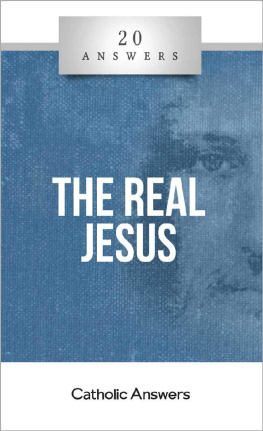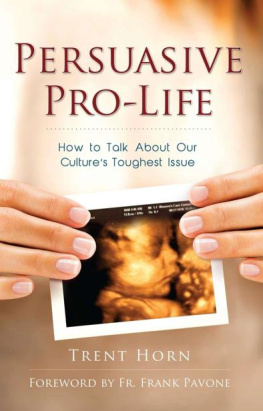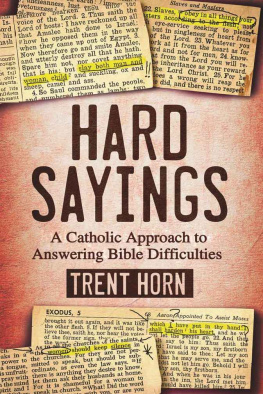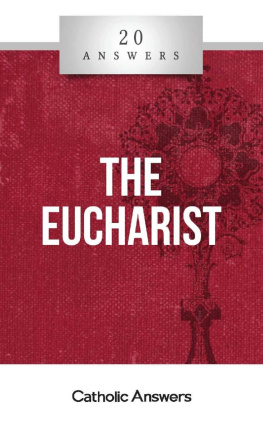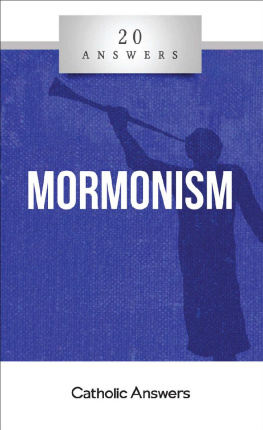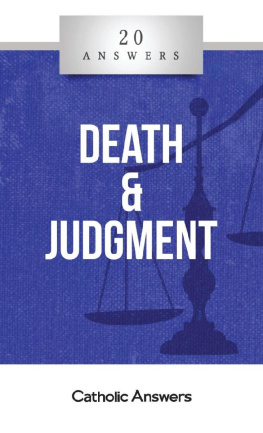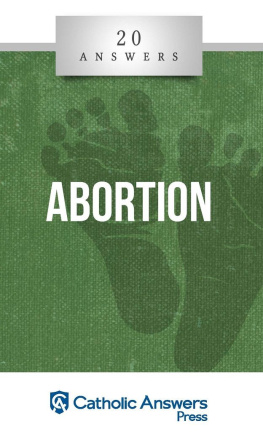Trent Horn - 20 Answers- The Real Jesus
Here you can read online Trent Horn - 20 Answers- The Real Jesus full text of the book (entire story) in english for free. Download pdf and epub, get meaning, cover and reviews about this ebook. year: 2016, publisher: Catholic Answers Press, genre: Religion. Description of the work, (preface) as well as reviews are available. Best literature library LitArk.com created for fans of good reading and offers a wide selection of genres:
Romance novel
Science fiction
Adventure
Detective
Science
History
Home and family
Prose
Art
Politics
Computer
Non-fiction
Religion
Business
Children
Humor
Choose a favorite category and find really read worthwhile books. Enjoy immersion in the world of imagination, feel the emotions of the characters or learn something new for yourself, make an fascinating discovery.
- Book:20 Answers- The Real Jesus
- Author:
- Publisher:Catholic Answers Press
- Genre:
- Year:2016
- Rating:3 / 5
- Favourites:Add to favourites
- Your mark:
- 60
- 1
- 2
- 3
- 4
- 5
20 Answers- The Real Jesus: summary, description and annotation
We offer to read an annotation, description, summary or preface (depends on what the author of the book "20 Answers- The Real Jesus" wrote himself). If you haven't found the necessary information about the book — write in the comments, we will try to find it.
20 Answers- The Real Jesus — read online for free the complete book (whole text) full work
Below is the text of the book, divided by pages. System saving the place of the last page read, allows you to conveniently read the book "20 Answers- The Real Jesus" online for free, without having to search again every time where you left off. Put a bookmark, and you can go to the page where you finished reading at any time.
Font size:
Interval:
Bookmark:
20 Answers
The Real Jesus
Trent Horn

20 Answers The Real Jesus
2014 Trent Horn
All rights reserved. Except for quotations, no part of this book may be reproduced or transmitted in any form or by any means, electronic or mechanical, including photocopying, recording, uploading to the Internet, or by any information storage and retrieval system, without written permission from the publisher.
Published by Catholic Answers, Inc.
2020 Gillespie Way
El Cajon, California 92020
1-888-291-8000 orders
619-387-0042 fax
catholic.com
Printed in the United States of America
ISBN 978-1-938983-93-1 paperback
ISBN 978-1-938983-94-8 Kindle
ISBN 978-1-938983-95-5 ePub
Table of Contents
Introduction
In 1813, Thomas Jefferson composed The Life and Morals of Jesus of Nazareth (later known as the Jefferson Bible) by using a razor to cut out sections of the New Testament that he felt were the only reliable descriptions of the real Jesus life. Jefferson was a deisthe believed that God doesnt intervene in the worldso parts of the New Testament about Jesus claim to be Gods son, and the vindication of that claim through miracles, ended up on a literal cutting room floor. What remained was the story of a wise moral teacher who was tragically killed and then buried in a tomb.
Jefferson would not be the only explorer in what would later be called the quest for the historical Jesus. This quest has taken many forms over the past two centuries. In our age we see it every Christmas and Easter in lurid tabloid headlines promising the shocking truth about the Jesus we never knew. There are even whole groups that exist solely to extract the real story of Jesus from the Jesus of religious myth. One such group is the Jesus Seminar , a collection of skeptical scholars who publish an annotated collection of the Gospels. This collection includes the recorded sayings of Jesus printed in different colors based on the probability (in their opinion) that the historical Jesus ever really uttered them. (Their conclusion? Less than 20 percent of Jesus words make the cut.) Other groups of skeptics, called mythicists, go even further, claiming that Jesus never existed at all: He was just a myth invented by early Christians. If that were true, then Christianity would be a waste of time and, as Paul says in 1 Corinthians 15:17, our faith would be in vain and we would still be in our sins.
Is the Christ of faith a mere fantasy? Or is he the same person as the Jewish carpenter who lived in Palestine 2,000 years ago? This is an essential question. As Pope Benedict XVI wrote in his book Jesus of Nazareth, For biblical faith the historicityand thus the facticityof the Incarnation is indispensable. Faith demands that we consider Jesus as approachable by historical research.
Since faith and reason cannot contradict one another, there must be rational, evidence-based answers to pressing questions about Jesus of Nazareth that do not contradict the Christ of faith who is worshipped by billions of Christians around the world. In this booklet we will look at some of those answers.
1. Is there any evidence that Jesus actually existed as a historical person?
To judge by some very recent controversies, you might think that scholars are bitterly divided over this question. But in reality, that Jesus really existed is a mundane and rarely contested fact of history. As Bart Ehrman, an agnostic scholar who is widely regarded as an expert on New Testament documents, writes, The view that Jesus existed is held by virtually every expert on the planet.
When skeptics ask, Is there evidence for Jesus? they usually mean Is there non-biblical evidence for Jesus? Their question betrays the hidden assumption that the Bible does not count as historical evidence. But why should we rule out the Bible as evidence that Jesus existed?
Some critics will say that the Bible is biased text that contains stories of miracles, which means its unreliable as history. But such criteria would make it virtually impossible to do any ancient history, since ancient historians were also biased, and many of them (such as Tacitus or Herodotus) also recorded miracle stories. Yet modern historians dont discard ancient accounts of history, but investigate them and critically examine their historical content. And even if skeptics were determined to dismiss the historical reliability of the Gospels, we could use the principles of historical inquiry to come to the conclusion that Jesus existed by examining another biblical source: the letters of St. Paul.
Sometime in the early A.D. 30s, Paul underwent a conversion: from persecutor of the fledgling Church to an apostle who went on to write several letters defending and clarifying Christian theology. His authorship of major New Testament epistles such as Romans, Corinthians, and Galatians is well established even among skeptical scholars. In those letters Paul makes it clear that the Jesus he believed in was a man who was descended from David (Rom. 1:1-3), was born of a woman (Gal. 4:4), had a last supper with his disciples (1 Cor. 11:26), was crucified and rose from the dead (1 Cor. 15:3-7).
Paul was able to corroborate this information because he met the disciples of Jesus; he recorded that meeting in Galatians 1:18-19. In fact, the Greek word that Paul uses to describe this discussion with the apostles about Jesus is historesai, from which we get the word history. In that passage, Paul describes a personal meeting he had in Jerusalem with Peter and James, the latter of whom he described as the brother of the Lord. If Jesus had been a mere legend, then surely one of his alleged relatives, not to mention his chief apostle, would have known it.
Some of those who deny that Jesus existed claim that brother of the Lord does not mean that James was Jesus flesh-and-blood relative, (The Greek word can mean brother, cousin, or another close relative.) but rather a spiritual brotherjust as today Christians will call each other brother and sister. But if that is what Paul meant, then why isnt Peter also described that way? Moreover, why is James called the brother of the Lord as opposed to a brother? Other critics claim that James was really the leader of a pre-existing Jewish monastic group called the brothers of the Lord. But we have no corroborating evidence that such a group existed in Jerusalem at that time.
Instead, a fair reading of Pauls letters shows that he believed Jesus was a real person and since he met the apostles who actually knew Jesus during his ministry, we have a great piece of evidence for the existence of Jesus.
2. But is there any evidence outside of the Bible that Jesus was real?
The first-century Jewish historian Josephus mentions Jesus twice in his monumental history of the Jewish people called Antiquities of the Jews. The shorter reference is in Book 20, where Josephus describes the stoning of lawbreakers in A.D. 62. One of the criminals is described as the brother of Jesus, who was called Christ, whose name was James. What makes this passage authentic is that it lacks Christian terms like the Lord, it fits into the context of this section of the Antiquities , and its found in every manuscript copy of the Antiquities. According to New Testament scholar Robert Van Voorst, The overwhelming majority of scholars hold that the words brother of Jesus, who was called Christ, are authentic, as is the entire passage in which it is found.
The longer passage in Book 18 is called the Testimonium Flavianum. Scholars are divided on this passage because although it does mention Jesus, it contains phrases that were almost certainly added by later Christian copyists. These include phrases that would never have been used by a Jew like Josephus, such as, He was the Christ or he appeared alive again on the third day.
Next pageFont size:
Interval:
Bookmark:
Similar books «20 Answers- The Real Jesus»
Look at similar books to 20 Answers- The Real Jesus. We have selected literature similar in name and meaning in the hope of providing readers with more options to find new, interesting, not yet read works.
Discussion, reviews of the book 20 Answers- The Real Jesus and just readers' own opinions. Leave your comments, write what you think about the work, its meaning or the main characters. Specify what exactly you liked and what you didn't like, and why you think so.

